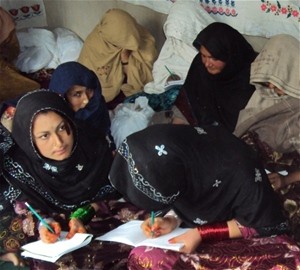
The women of Kahrotai Village are pleased to have the opportunity to take skills and literacy courses.
ECW
Literacy courses and skills training empower women in eastern Afghanistan.
With USAID’s support, the Educational and Training Center for Women and Girls of Afghanistan (ECW) is providing literacy skills and creating new opportunities for women living in Nangarhar, Kunar, and Laghman provinces.
13 JUNE 2010 | EASTERN AFGHANISTAN
Twenty-four-year-old Wahida received a good education when she was living as a refugee in Peshawar, Pakistan. However, when she returned to her village in Afghanistan, she was surprised by new obstacles and few opportunities. Due to poverty, her brother was forced to quit school and work to support the family. Wahida wanted to help by becoming a teacher at a nearby high school for girls, but her brother objected. “I don’t want you to go out of the house,” he said. “Don’t you know that the girls of this village only perform household chores and nothing else?”
Wahida’s opportunity was realized when the village malik (elder) came to her house to talk about USAID’s Support to Women in Skills, Entrepreneurship, and Literacy project. Knowing that Wahida was well-educated, he wanted her to get involved and help establish a literacy center in the village.
The Support to Women in Skills, Entrepreneurship and Literacy project works to improve the economic condition of 630 vulnerable women and girls in eastern Afghanistan. Training workshops improve women’s skills in tailoring, embroidery, carpet weaving, food processing, and weaving so that they can produce quality goods and sell them to earn an income. In addition, women like Wahida teach literacy classes in 25 centers throughout eastern Afghanistan with the cooperation of the Educational and Training Center for Women and Girls.
The elder succeeded in convincing her brother that the opportunity was safe and would benefit Wahida and other women. “People in our village do not understand that women and men have an equal right to study. It is the responsibility of people like you and me to take initiative and make girls’ education available and eliminate illiteracy,” he explained.
Wahida is currently working as a literacy teacher with 25 women enrolled in her class. In addition to teaching, she regularly stresses the importance of education for women and girls. Her students spread the same message to their family members. Young girls who used to spend their days doing chores are now attending school. Wahida found that one person can make a real difference in the lives of others.







Comment
Make a general inquiry or suggest an improvement.